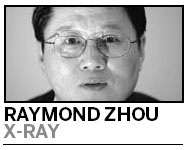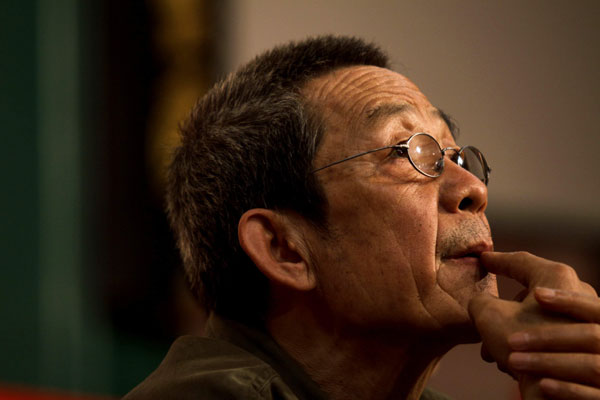The puppet master
Updated: 2012-09-22 07:50
By Raymond Zhou (China Daily)
|
||||||||
|
Lin Zhaohua, known in theatrical circles as a pioneer, has never stopped experimenting in the past 30 years. Jiang Dong / China Daily |
Lin Zhaohua may be a towering figure in Chinese theater, but it is not easy to sum up his art. Just when you form an opinion of him, he defies it by creating something new.
To watch Lin Zhaohua rehearse a play is a revelation. More accurately, it is a shock, at least to thespians who have not worked with him. He does not give instructions, only telling his actors what not to do - after they did it.
As an actor, you can do anything you want. Yet, you would be frightened by such a high level of freedom - or a lack of framework if seen from another angle. As He Bing, who has appeared in 19 of his plays, concludes, only the most experienced and best-prepared actors can survive in a Lin Zhaohua play, or he'll feel lost.
As lost as Lin himself sometimes gets when debating with theorists.
At a recent forum commemorating 30 years of his theater work, arguably the most celebrated - and also the most controversial - of China's theatrical directors rambled from the stage and picked a "fight" with a scholar who studies drama, especially his style. At a later session, Lin, who was supposed to sit in the audience, strolled onto the stage to join the discussion. Yet, halfway, he swerved to the side stage.
It was a perfect manifestation of his work style - spontaneous, instinctive and somewhat aimless, but always gripping. Lin may not be the most lucid articulator of his own aesthetics, but what he has been doing in the past three decades has undoubtedly become a rich legacy of the Chinese stage.

In 1982, Lin, an actor-turned-director at Beijing People's Art Theater, got a script that had been turned down everywhere. It was written by a new playwright named Gao Xingjian. Gao had studied French literature and was among the earliest in China to be exposed to contemporary influences of Western arts and literature.
The result was Absolute Signal, a small-theater piece that ran for 159 performances that year and created a revolution in the country's performing arts. In the ensuing years, Lin and Gao, as director and playwright, created Bus Stop (1983) and Wildman (1985), sending shockwaves through the tradition-bound Chinese theater.
Many credit the Lin-Gao collaboration of the 1980s as whipping up a storm in Chinese theater and criticize People's Art Theater for whitewashing this glorious chapter from its history. (Gao went on to win the 2000 Nobel Prize for Literature.)
Defiance against conventions
Ever since the founding of New China in 1949, Chinese theater had been following the teachings of Constantin Stanislavski and the practice of socialist realism. Theatrical artists strove to present as realistic a world as possible on the stage, with sets that were mammoth, lifelike and took a long time to change. Actors attempted to immerse into the roles, completely forgetting themselves in the process.
"Bullshit" was Lin's response to what many consider the ultimate state of acting. Actors always have a dual function on stage, insists Lin. They are on one hand the roles, and at the same time can look on at the roles. These two functions may fluctuate and overlap during the course of creation, but never will one take over the other completely.
As a matter of fact, Lin's theory on acting is summarized in an analogy: An actor should be the puppet and the puppet master simultaneously.
Pu Cunxin, Lin's most frequent collaborator and a star in his own right, surprised many by saying at the forum that he does not have in his genes what Lin usually wants, but his solid training in theatrical traditions makes it possible for him to "relax", as Lin demands of his actors. "A bad actor would fare worse in Lin's plays than he usually would," suggests Pu.
Lin's departure from the modern realistic theater leads him back to China's own theatrical tradition of folk operas, such as Peking Opera. The minimalist sets leave much room for imagination, thus fitting the emerging venues of small theaters. Acting is no longer total immersion, but make-believe with conviction. Actors seem to be liberated from the confines of the stage and gain a new freedom as large as their imagination allows.
At the forum, there was much discussion about the "fourth wall", the imaginary boundary between the stage and the audience. Realistic theater respects the fourth wall; German playwright and stage director Bertolt Brecht, who also drew inspiration from Chinese operas, intended to break it. What Lin Zhaohua did, according to Lin Wei-Yu, a Taiwan scholar who spent years studying the mainland director's art, is to totally ignore it. "There is no fourth wall in his eyes."
Young stage directors today no longer need to agonize over things like the use of the proscenium curtain between acts. The concept of the fourth wall may even be foreign to them. They can do whatever they want because pioneers like Lin Zhaohua have blazed the trail for them. But some scholars warn against treating Lin Zhaohua's style as a new ritual that binds more than unfetters.
In the past 30 years, Lin Zhaohua has directed more than 50 productions, mostly plays. He runs the full gamut from extremely realistic to very avant-garde. His version of Teahouse would make Stanislavski smile. His use of blind performers in the one-act play The Blind, written by Maurice Maeterlinck, was bold and provocative. He never stops experimenting. For one, he merged Chekov's Three Sisters with Beckett's Waiting for Godot. He was once inspired by the illustrations in The Divine Comedy to do a stage version of Dante's epic poem, an idea that fell through.
Young and fearless
As someone who has seen only 20 of his creations, I cannot claim to be an authority on Lin Zhaohua's art. Many of his productions struck me as works-in-progress. In other words, he breaks conventions, yet hardly can his experiments be called new ones. He is on the constant prowl for new ways of theatrical expression that he often ends up titillating more than satisfying.
In Hamlet, the protagonist is no longer the indecisive prince we know. But what is he? What part of the richly textured play does Lin's interpretation highlight? Does this new Hamlet have any relevancy in the world we live in? It seems quite muddled to me. The value of his production lies in his courage to challenge the status quo, so to speak, when most Chinese, even the highly educated, were taught that only one interpretation, usually using Marxist class theory, is official.
That said, there are productions that are extremely polished and highly gratifying. Five Stories of Lao She has the perfect balance between the straight play and the traditional Chinese opera. The Chinese aesthetics, instead of standing in jarring juxtaposition with what is essentially a Western import (China did not have an indigenous all-talk format in its stage art) seeps into every stage movement and every design detail. Yet, it is not a replica of, say, Peking Opera.
Cao Yu, China's most accomplished modern playwright, was surprised when he learned Lin Zhaohua was 51 the year he inquired of the director's age.
"I thought you were a young man," said Cao. Now in his 70s, Lin is still young at heart. He is known as "dadao" (the big director) in theatrical circles, but actress Xu Fan reveals that those who frequently work with him call him "Little Lin", and some even use "Huahua", a moniker Chinese often associate with children or pets.
"When are you going to address me as 'the old artist'?" Lin retorted, in mock anger and referring to the unofficial title equivalent to the term "legendary" for retired Hollywood personalities.
It is funny that people argue over what school of theatrical art Lin's should belong to. Perhaps Yi Liming, his protege, says it best: "Yes, Lin Zhaohua's practice comes from a Western person. It is not Stanislavski or Brecht. It is Don Quixote. He regards tradition as flowing and growing, not static. He is always creating, with some results immature or absurd, but that does not take away from his creative trajectory. He has never stopped tilting at the windmill."
Contact the writer at raymondzhou@chinadaily.com.cn.

 'Taken 2' grabs movie box office crown
'Taken 2' grabs movie box office crown
 Rihanna's 'Diamonds' tops UK pop chart
Rihanna's 'Diamonds' tops UK pop chart
 Fans get look at vintage Rolling Stones
Fans get look at vintage Rolling Stones
 Celebrities attend Power of Women event
Celebrities attend Power of Women event
 Ang Lee breaks 'every rule' to make unlikely new Life of Pi film
Ang Lee breaks 'every rule' to make unlikely new Life of Pi film
 Rihanna almost thrown out of nightclub
Rihanna almost thrown out of nightclub
 'Dark Knight' wins weekend box office
'Dark Knight' wins weekend box office
 'Total Recall' stars gather in Beverly Hills
'Total Recall' stars gather in Beverly Hills
Most Viewed
Editor's Picks

|

|

|

|

|

|
Today's Top News
Health new priority for quake zone
Xi meets US top military officer
Japan's boats driven out of Diaoyu
China mulls online shopping legislation
Bird flu death toll rises to 22
Putin appoints new ambassador to China
Japanese ships blocked from Diaoyu Islands
Inspired by Guan, more Chinese pick up golf
US Weekly

|

|







